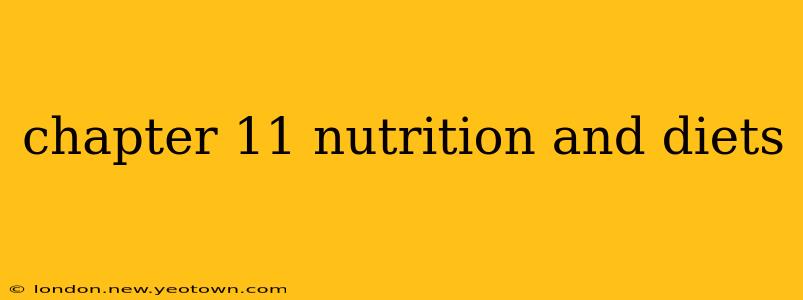Welcome, fellow adventurers, to Chapter 11 of our journey towards a healthier, happier you! This isn't just about restricting calories or following the latest fad diet; it's about understanding the intricate dance between nutrition and your overall well-being. We'll explore the fundamental principles of a balanced diet, debunk common myths, and equip you with the knowledge to navigate the often confusing world of nutrition. This isn't a quick fix; it's a lifestyle transformation, one delicious, nutritious bite at a time.
What are the essential nutrients and their functions?
Our bodies are amazing machines, constantly working to keep us running. To do this, they need fuel – and that fuel comes from essential nutrients. Think of these as the building blocks of your health. We're talking about carbohydrates, proteins, fats, vitamins, minerals, and water. Each plays a vital role, like a perfectly orchestrated symphony.
Carbohydrates: Your primary energy source, fueling your brain and muscles. Found in grains, fruits, and vegetables.
Proteins: The body's building blocks, essential for muscle growth and repair, hormone production, and enzyme function. Sources include meat, fish, beans, lentils, and tofu.
Fats: Crucial for hormone production, cell function, and nutrient absorption. Choose healthy fats found in avocados, nuts, seeds, and olive oil, while limiting saturated and trans fats.
Vitamins and Minerals: These micronutrients act as co-factors in countless biochemical reactions, supporting various bodily functions. A balanced diet provides a wide spectrum of these vital compounds.
Water: The unsung hero. It's involved in almost every bodily process, from temperature regulation to nutrient transport. Aim for plenty of water throughout the day.
Understanding the role of each nutrient helps you make informed food choices, building a diet that supports your overall health and well-being.
What are the different types of diets, and which one is right for me?
The world of diets can be overwhelming. From keto to vegan, paleo to Mediterranean, the options seem endless. The truth is, there's no one-size-fits-all answer. The best diet for you depends on your individual needs, preferences, and health goals.
Popular Diet Approaches:
-
Mediterranean Diet: Emphasizes fruits, vegetables, whole grains, legumes, and healthy fats, with moderate amounts of fish and poultry. Known for its heart-healthy benefits.
-
DASH Diet: Designed to lower blood pressure, focusing on fruits, vegetables, whole grains, and lean protein.
-
Vegan and Vegetarian Diets: Exclude all animal products (vegan) or meat (vegetarian). Require careful planning to ensure adequate nutrient intake.
-
Ketogenic Diet: Very low in carbohydrates, high in fat. Can lead to weight loss but requires careful monitoring.
Finding the Right Fit:
Instead of jumping on the latest fad, consult a registered dietitian or healthcare professional. They can help you assess your individual needs, identify potential deficiencies, and create a personalized nutrition plan that aligns with your health goals and lifestyle.
How can I plan a healthy and balanced diet?
Planning a healthy diet doesn't have to be complicated. It's about making mindful choices that nourish your body and soul.
Tips for Success:
-
Focus on whole, unprocessed foods: Fruits, vegetables, whole grains, lean proteins, and healthy fats are your best friends.
-
Read food labels: Pay attention to serving sizes, calories, and nutrient content.
-
Cook more often: This allows you to control ingredients and portion sizes.
-
Plan your meals: Knowing what you'll eat ahead of time helps avoid impulsive, unhealthy choices.
-
Listen to your body: Pay attention to your hunger and fullness cues.
-
Enjoy your food! Healthy eating shouldn't feel like a punishment. Find foods you love and incorporate them into your balanced diet.
What are some common myths about nutrition and dieting?
The internet is rife with misinformation, and nutrition is no exception. Let's debunk some common myths:
-
Myth: Skipping meals helps you lose weight. Truth: Skipping meals can lead to overeating later in the day and disrupt your metabolism.
-
Myth: All fats are bad for you. Truth: Healthy fats are essential for your body's functions.
-
Myth: Carbohydrates make you fat. Truth: It's the type of carbohydrates and the overall calorie intake that matters.
-
Myth: Detox teas and cleanses are necessary for weight loss. Truth: Your liver and kidneys are perfectly capable of detoxifying your body. These products are often ineffective and can even be harmful.
How can I make sustainable dietary changes?
Sustainable change isn't about drastic measures; it's about gradual, manageable adjustments.
-
Start small: Don't try to overhaul your diet overnight. Make one or two small changes at a time.
-
Find support: Talk to friends, family, or a registered dietitian for encouragement and accountability.
-
Be patient: It takes time to form new habits. Don't get discouraged if you slip up occasionally.
-
Celebrate your successes: Acknowledge your progress and reward yourself in healthy ways.
This journey towards optimal nutrition is a marathon, not a sprint. Embrace the process, learn from setbacks, and celebrate your victories. Your health and well-being are worth it!

